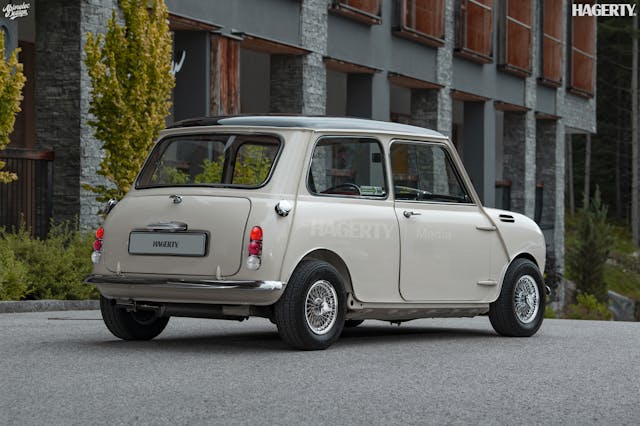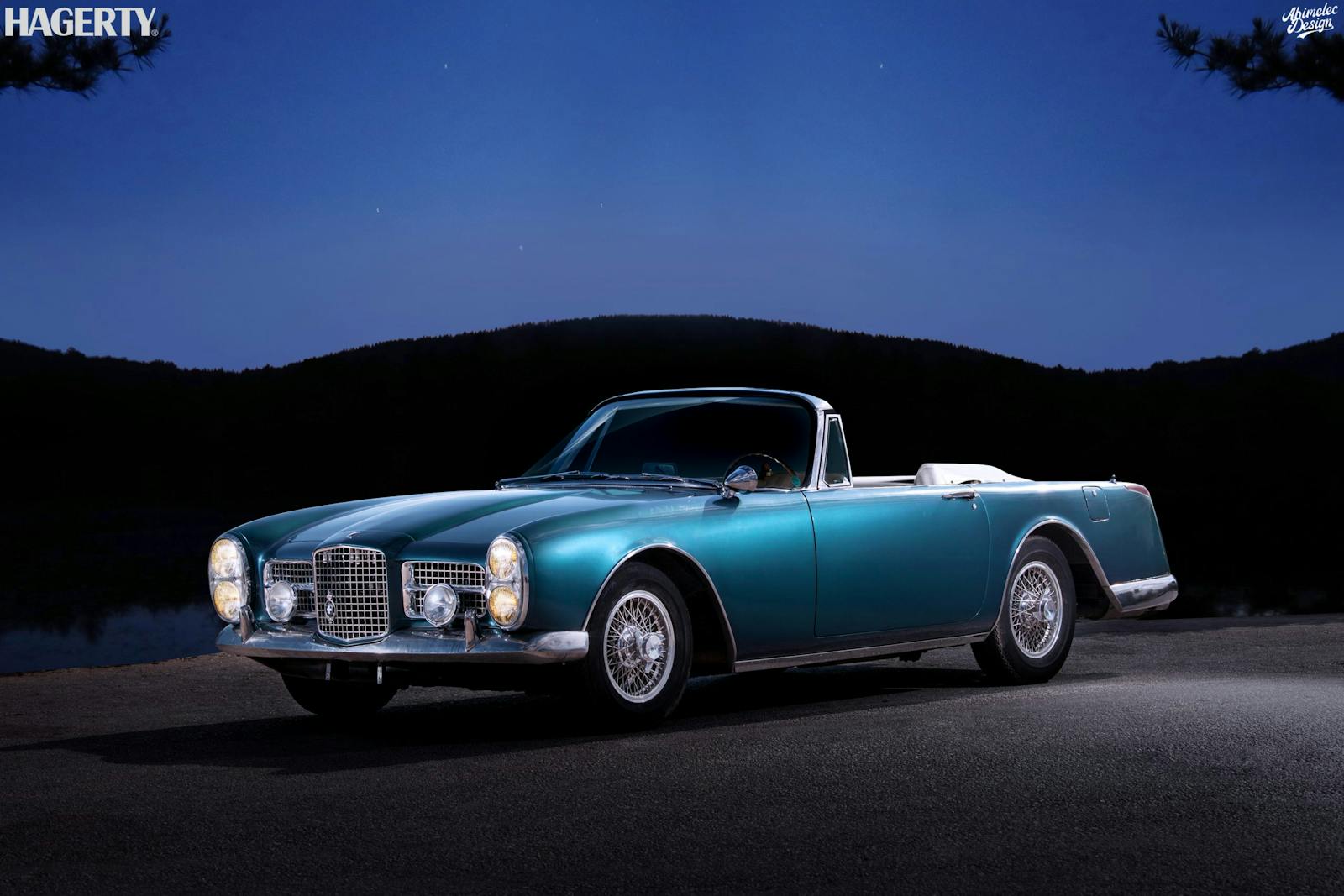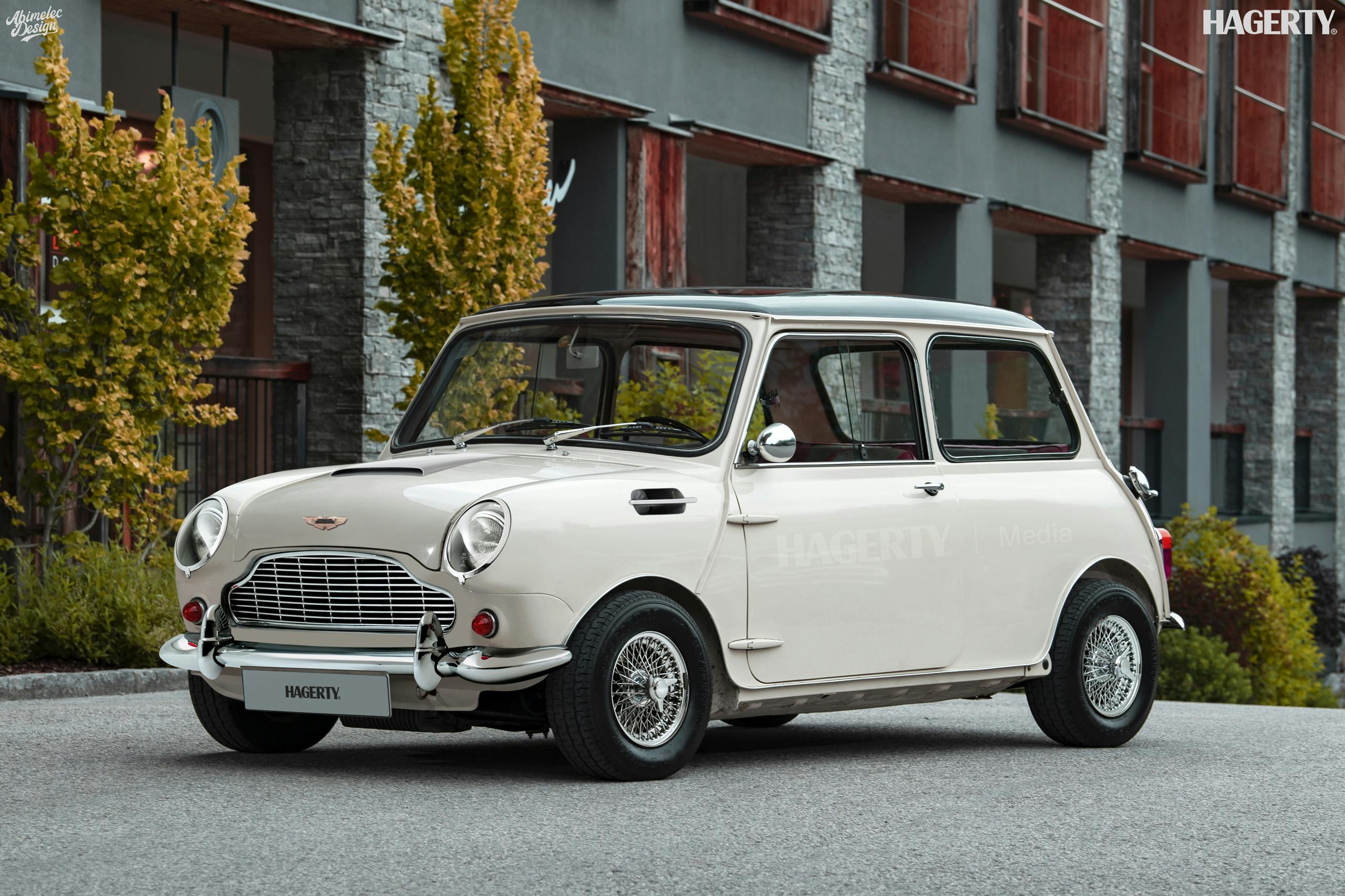Media | Articles
What If? Quick Take: 1966 Aston Martin Cygnet
Welcome to What If? Quick Take, a new feature from imaginative illustrator Abimelec Arellano and Hagerty. While the cars shown in our regular What If? features are full 3D renderings and can appear in any number of images, the Quick Takes are off-the-cuff expressions of Abimelec’s imagination. Each one is accompanied by a short story. Enjoy! — Jack Baruth
“You’re the saddest little rich boy in a city full of sad little rich boys,” the girl told him. “Quite an accomplishment, really, to be that drab … that square.” Mick shuddered involuntarily, possibly more from the accuracy of her observation than the cruelty of it, but couldn’t bring himself to turn back and face the bar. It was just after three in the afternoon, March 16, 1968. Mick was on his favorite chair in his favorite pub, just around the corner from Carnaby Street and around another corner from his astounding Soho flat. It was his habit to drink here in the afternoons—or at least to start in the afternoons.
Prior to his marriage, he would drink until they threw him out then stagger back to the flat. Nowadays, Fiona would often come get him early. Other nights she didn’t bother to come get him at all, and she wasn’t home when he finally made it there. She would stroll in the next morning and wave his complaints off airily. “I was with my guru,” she would state, “practicing enlightenment. You could use a little of that yourself, Michael.” It ground at Mick, how she refused to call him by his recently chosen nickname.
A notice to readers: Comments on new Hagerty articles have been disabled due to technical issues since July 29th. Don’t worry, the comments are coming back soon, and when they do, we’ll have a contest or giveaway to reward our readers for their patience. Never stop driving! — Jack Baruth
“It’s true,” Mick admitted to this fascinating girl seated next to him, this Twiggy lookalike in her Mary Quant dress and flawless dark bob, “I’m a sad little rich boy. Don’t bother to hate me for it. I already hate myself. I’m thirty-one years old and I’ve never done anything on my own. My father bought my flat for me, he pays my expenses. He even bought my Aston Martin.” The girl had clearly been losing interest, but now she perked up again.
Marketplace
Buy and sell classics with confidence
“You have an Aston Martin? Like … James Bond?” Mick snorted ruefully.
“Not quite. It’s called a Cygnet. It’s like a Mini.”
“Minis are hip,” she replied. “Is it hip like a Mini?” Sensing, however dimly, that he was in the presence of the first person he’d ever met who wouldn’t think the Cygnet was stupid, Mick rose to the occasion.
“Like a Mini, but better. Wire wheels. 1275cc Cooper spec motor. Four-speed with a special Laycock overdrive unit fitted. Connolly leather interior. Completely happy on the A1 or the B-roads or here in the city. Mater thought I deserved something special for my, ah, rather tardy completion of my studies at Newcastle. The tyres are special Avon …” The girl waved her hand in Mick’s face to shut him up.
“Never mind all of that prattle. You have a car, which is capital, because we need a car. Tomorrow, some friends of mine and I are protesting the pigs and the war in Vietnam at the American Embassy. My, ah, friend, Simon, says that they’re going to turn off the Tube so people can’t get there. But you can drive us, Mick, can’t you? Of course you can. What’s your address? We’ll be there in the morning and you can drive us over.”
“Well,” Mick countered, “I’d have to talk to Fiona about it, and …”
“I don’t know who Fiona is,” the girl snapped, “and I don’t care. Some dowager aunt, I suppose. Never mind that. Tell me where you live.” More than anything else in this world, Mick wanted to be liked. He knew that most people hated him on sight, saw his hangdog face and curled-in body language as deserving of ridicule. At school the older boys had called him “Lord Michael” and had beaten him mercilessly for years. When he’d confessed that to Fiona shortly after their marriage, hoping she would comfort him, she instead laughed and began calling him “Lord Michael” around the flat. The hell with Fiona. Why did I marry her? Five years older than me, unable to have children, and she’d already seen half of London before me. A mild defiance rose in him.
“Fine, come over, I believe in social justice,” he said, and wrote his address on a bar napkin. Late that evening, he staggered home expecting to defend his decision to Fiona, but she was gone again. The space in the bed next to him was still empty when a frightful banging on his door woke him, sometime around 10:15 the next morning. “Coming,” he yelled, but he owned the whole floor and so the banging just increased in intensity during his long walk to the locks.
No sooner had he cracked the door than four people burst in on him. There was the girl from yesterday—”We were never formally introduced,” she said, “I’m Saffron”—and Simon, who was a pudgy, sour-looking fellow in a Che shirt. The other two fellows were lean, tall, Black, almost interchangeable-looking. They shoved past him into the flat.
“Nice pad, mate,” one of them said. “I’m William and this is my brother Robert. Saffron says you’re giving us a ride to the demonstration. Hard to believe a posh wanker like you cares much about the cause, innit?” Mick drew himself up to his mild height and prepared to correct him.
“To the contrary, I’m passionate about the working man and justice for the oppressed. I’ve written to the Times several times suggesting that taxes on people like me be raised. Those of us who inherited our good fortune have a social responsibility to—”
“Oh, save it, you bloody prat,” Robert interrupted. “Here you are, going on about the working man and such. Ever held a real job? Ever do anything without Daddy’s money? If you are so conscious of your privilege, you ever think about just donating this flat to a foundation that could help the poor here in London? Ever think about selling your Aston Martin and helping out the poor? Or are you just some wanker who wants to be liked so badly that he’ll pretend to be a socialist right up to the moment that we have actual, equitable redistribution of property? Go on, then, momma’s boy!”
“Sir, I didn’t ask to be insulted in my own home.”
“Good, because I didn’t ask for your opinion on it.” Robert glowered at him until Mick dropped his eyes and went to the liquor cabinet.
“Anyone want a drink?”
“Now you’re talking, guv.” Robert shoved past him and took the bottle of Scotch his father had given him for his 21st birthday. Before Mick could protest, Robert had the cap off it and they were passing it around. After everyone had taken a few slugs, Simon motioned for everyone’s attention.
“Right, then. Crassus here is going to drive us down to the embassy, where we will join with the masses and swim with them as the fish in the parable. I remind you that the sole purpose of our attendance is to compel the attention of the world to the Oriental man who is being firebombed and oppressed by the fascist American pigs. Once the cameras leave, we leave. Hmm,” he continued, “we could use a little walking-around money for after the fact. I suppose you have a few banknotes in this palace, my good man?”
“I mean, I keep a few hundred quid for emergencies,” Mick replied, “but …”
“Right then, hand it over and let’s all be on our way.” Mick was seriously considering ringing the police right then and there but, wonder of wonders, Saffron bounded up to him and breathed,
“You’re really doing it! You’ve really got the minerals!” And she kissed him on the cheek. Mick hadn’t been kissed very much in his life. His Swinging London pad had seen a parade of women before his marriage, but they’d all been for his mates; they’d tease Mick that he was the only fellow in Soho who couldn’t get it done with a place like this. After verifying his financial bona fides, Fiona had done the bare minimum before their marriage. Afterwards, she seemed to be primarily interested in her guru. So this kiss was all Mick really needed to turn the tide of his ardor.
“Let’s go then!” he yelled. Downstairs, the two brothers flanked Saffron in the back seat while Simon perched up front like an annoyed seabird. In the rearview mirror, Mick could see Saffron nuzzling Robert, then William, then back to Robert.
“Mate,” Robert said, “this is the most posh Mini I’ve ever seen, innit?”
“Don’t get him started on his car,” Saffron laughed, and Mick’s face flushed.

Three blocks from the Embassy, they rounded a corner and confronted a sea of humanity. There were people as far as the eye could see, filling the streets. The noise of the crowd was palpable, terrifying, exhilarating. Mick parked the Cygnet and they spilled out into the middle of the action. People were dressed in absurd fashion. One girl was topless, drunkenly swaying against the arm of some bearded fellow holding a sign that said “END THE SLAUGHTER.” The smell was intense: patchouli, grass, sweat, heat. Mick turned to look for Saffron but she was gone. He thought he spotted the curly head of Robert—or was it William?—moving purposefully in the distance, but he didn’t have a prayer of catching up to them.
He milled around like that for what felt like hours, never getting anywhere near the Embassy. His feet hurt and his eyes were bleary from all the smoke around him, tobacco and more. Then he heard a voice coming from a loudspeaker somewhere, ordering the crowd to disperse. The voice went on and on. Mick thought now would be a good time to leave, but he had no actual idea where he was.
Then he heard, or more precisely felt, a surge of fear and agitation in the crowd. Leaping off his feet, he could see a line of mounted police moving their horses in his direction. He panicked and began to run at precisely the same time as everyone else. There were bodies all around him; bumping, shoving, screaming. A woman ahead of him fell and was promptly trampled; Mick felt the heel of his Lobb brogue sink into her face as he ran over her body. What else could he do? To stop was to guarantee the same fate as hers.
He was running blindly, in panic, when the crowd parted ahead of him and he ran headlong into his own Cygnet, tumbling over the attenuated bonnet and spiderwebbing the Triplex windshield. The Cygnet was dented, battered on all sides, and with the crush of people all around there was no chance of opening a door, so Mick crawled over the roof, opened the decklid, and shielded some of his body within the quilted-leather boot.
By the time the horses went by him, avoiding the Cygnet as he’d hoped, the street was mostly empty. Mick fired up the little Aston and drove back to his flat. Once there, he stepped out and surveyed the damage. Both headlights were smashed, the Aston grille had been kicked in. Someone had used a sharp object to carve “PIG” into the passenger door. There wasn’t a straight panel or clear pane of glass left on the car. Someone had bled all over the driver’s seat; Mick realized that he was that someone, and that at some point he’d received cuts to the head and neck, who knew from what.
Wearily, he mounted the steps to his flat. Fiona was seated in the dining room, having tea with a lithe Asian fellow he recognized at once as her guru. “Well,” Fiona spat, rising to her feet and placing her hands on hips, “what do we have here, Lord Michael?”
“I was … in the demonstration. There was a bit of a row. The Aston was demolished, sad to say.”
“You,” Fiona smirked, “were in the demonstration. The one that’s on the telly. At the American Embassy.”
“Yes. There was quite a bit of violence. I was lucky not to be injured.”
“And, pray tell, why were you demonstrating?” Mick realized he didn’t have a ready answer.
“Because,” he sputtered, “something must be done!” Fiona and the guru laughed in musical harmony. There was a knock at the door. Mick opened it to find his mother standing there, impeccable in pearls and paisley.
“Michael … we saw the car outside and were worried. What happened?” Before Mick could actually open his mouth and respond, he found himself imagining something he hadn’t actually seen: Saffron, running into the crowd, her slim miniskirted hips and dark bob weaving, the noise of her laughter, her right hand trailing behind her as if she expected him to grab it and follow her. He burst into tears and buried his face into his mother’s shoulder.
“Mummy,” he surprised himself by sobbing, “I think I’m in love!”
“Oh, poor dear,” his mother replied, stroking the back of his head and absorbing his shivering into her short but solid frame, “Mummy will make it alright. Mummy and Daddy will always make it alright for you.”




